Travelling day today….I leave JFK for Paris at 5:30 pm, arriving in Paris around 6 ayem, and then taking an Easy Jet to Nice a couple of hours later. No more postings between now and sometime around 7 ayem Tuesday morning, New York time. At the earliest, I mean…
 Jeffrey Wells
Jeffrey Wells
Who Dies?
Not to take disaster or ensemble action films too seriously, but there are cultural reasons why certain characters die in films of this sort. There’s a literal pecking order, in fact, and Poseidon — a casualty itself — shows how it works.
The bottom line (and here comes the SPOILER that I warned readers about twice last week) is that two of the four people who die among Poseidon‘s small survivor group — Freddy Rodriguez and Mia Maestro — are Hispanic, and I think their blood is what seals their fate.
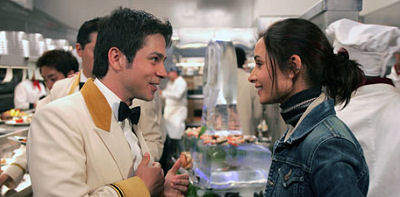
Poseidon‘s Freddy Rodriguez, Mia Maestro
I could shilly-shally all over the place about unconscious racism and how Poseidon‘s screenwriter Mark Protosevich and director Wolfgang Petersen are probably more forward-minded than most of us about racial matters, but I still say that Rodriguez and Maestro die in this film not just because they’re not big-enough stars, but also because Hispanics are considered to be culturally expendable.
I forget the name of the black comic (is it Chris Rock?) who does a routine about any time there’s a black guy among a group of kids in a horror film, you can count on his getting killed fairly quickly. This routine always gets a laugh because people know that it’s true, and I think a similar attitude has come through in Poseidon about Latinos.
< ?php include ('/home/hollyw9/public_html/wired'); ?>
Here’s how the disaster-film death system works, more or less…
The highest ranked is the self-sacrificing hero. He is always male, always played by a star, and he always buys it in the third act while trying to save others. Gene Hackman died this way in the original 1972 Poseidon, and a name-value actor dies this way in the present version.
The second death level is shared by two types — the selfish lout and the weak second-banana who can’t hack it.
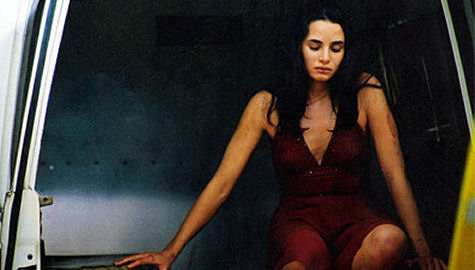
Mia Maestro
Kevin Dillon is Poseidon‘s resident blowhard, and you can tell he’s a goner from the moment he takes out his hip flask and takes a sip. If Maestro was not Agentinian she would be a good death candidate anyway because she plays the weakling of the group (i.e., unable to handle being in tight places). And yet Carol Lynley played a weakling in the 1972 version and lived.
The third candidates for the Great Beyond, as noted, are culturally expendable non-whites.
Gays used to be considered expendable or disposable — you can feel this attitude in genre movies of the ’60s — but they’ve moved up in the world to the extent that screewriters don’t dare kill them off or make them dislikable or villainous.
Rodriguez’s death inside an elevator shaft is arguably Poseidon ‘s most jarring moment.
His character, a busboy, is shown to be a brave and intelligent man, but then a metal table he’s standing on inside an elevator shaft gives way and he’s forced to cling to the leg of Richard Dreyfuss, a broken-hearted gay industrialist. Dreyfuss, in turn, is being held by star Josh Lucas. Lucas isn’t strong enough to pull Dreyfuss and Rodriguez to safety so he says to Dreyfuss, “Shake him off or you’ll both die!” And Dreyfuss finaly does.

Freddy Rodriguez, Eva Longoria
What if it had been Rodriguez shaking Dreyfuss off? That would have made for an even more startling scene. But Dreyfuss is a better-known actor than Rodriguez at this stage of the game ( Six Feet Under aside), and he probably got paid more, and he’s white…so Rodriguez had to die. But the way he’s gotten rid of is not just sadistic but disrespectful.
I was hoping that one of Poseidon‘s attractive white youths would die — Emmy Rossum, Jacinda Barret, Mike Vogel — or even the token kid, played by Jimmy Bennett. But the Death Rules state that the young must survive in order to go out in the world and procreate and propulgate the species.
A friend sold me on the culturally expendable idea a couple of weeks ago. I was initially skeptical but the more I thought about it the more convinced I became.
I ran it by Alejandro Gonzalez Innaritu and he said, “Of course! Of course!” I also ran it by a few Hispanic media types and journalists (American Entertainment Marketing’s Yvette Rodriguez, Jorge Camara of La Opinion, the National Hispanic Media Coalition’s Alex Nogales, Miami Herald film critic Rene Rodriguez) but we missed each other or they didn’t have much to say.
If anyone wants to chime in…
Another tribute piece to the great Charlie Kaufman, a screenwriter (Adaptation, Being John Malkovich) propelled by a kind of perverse impudence and irreverence. This profile is better than most and has been written by L.A. Times contributor David L. Ulin .
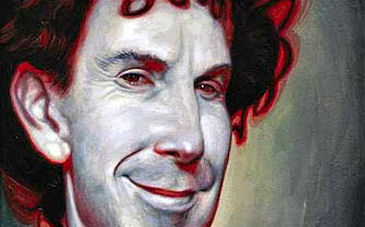
“If the [Cannes Film Festival] does not take itself seriously enough to use what power it still has to move the quality agenda forward, why would anyone else? (That is, outside of journalists who love getting a free trip to the South of France each year.) The truth is [that] Cannes has become far worse than Sundance in terms of selling out. Yet the unfamiliarity seems to be a condom from the contempt that has infected so many journalists and critics in recent years. And the studios are happy to be welcomed to abuse the credibility of the festival and to use it mercilessly as a platform to market their big, but not necessarily fine, movies to the more-important-than-home-in-many-cases European and world market.” — a not-unfair criticism from David Poland, a perennial non-attender who gets it on one level and misses it profoundly at the same time. The Cannes Film Festival exists and is trying to thrive in the world that we have made. That world, lamentably, includes gala screenings of Brett Ratner‘s X-Men 3: The Last Stand, but Cannes isn’t a hideaway haven like Telluride or the Bermuda Film Festival, and Poland finds that objectionable. I agree with him — there should be more aesthetic purity in the world — but he never goes to Cannes and I think you have to do that to get what it is and what it signifies. To roll with the film festival aesthetic of 2006 you need to be, on some level, a film-buff equivalent of a moral relativist . You can’t just sit on your squishy couch in Los Angeles and go, “Nyah-nyah.” You have to get on the plane, do the 18-hour days, sip the cappucino, file the stories and reviews and generally tough the whole thing out. Then and only then…
I haven’t seen Werner Herzog’s Rescue Dawn, but trust me (and you won’t need to take my word for it once you see it), this trailer is a very vague and misleading representation of what the film almost certainly is. The cutting, the bullshit slogans, the Apocalyose Now-styled percussion — it’s the same old shit, and s.o.s. is what you never get from a Werner Herzog film. This trailer is a marketing jerkoff’s idea of what he-she thinks (or what his-her agency boss thinks) will appeal to the schmucks out there looking to enjoy a standard-issue Vietnam-era prisoner-of-war escape drama. (Which isn’t to say Rescue Dawn will utterly ignore or wave off the expecations of this crowd.) Memo to marketing jerkoff: Werner Herzog’s films are never less than transcendent or stunning or cinematically challenging in the best way imaginable. Your efforts at trying to sell this film are predictable and understandable, but compared to Herzog’s vision and artistry your mentality is that of a fly sitting on the neck of a lion.
In tribute to the opening of Sydney Pollack‘s Sketches of Frank Gehry (Sony Classics, 5.19), which is easily one of the most spiritually uplifting films you’ll see this year (and I mean this), I did a phoner with Pollack a couple of weeks ago to recap and go over things.
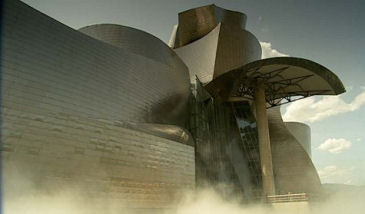
The sound file is sufficient, but here’s the piece I did eight months ago after first seeing Sketches at the Toronto Film Festival. I called it “a stirring, hugely likable portrait of the most daring and innovative architect of our time,” and said that “as corny as this sounds, Sketches left me with a more vivid feeling of celebration and with more reasons to feel enthused and excited about life than anything I’ve seen so far at this festival. It’s a film that lets you into the head of a genius in a very relaxed and plain-spoken way, and it lets you share in the sense of being a person of Gehry’s magnitude — a guy who has created a kingdom out of a supreme confidence in his dreams, but at the same time someone honest enough to admit he doesn’t precisely know what he’s doing much of the time. This is partly due to Gehry having been very open and unguarded with Pollack as the doc was being shot, and partly due to Pollack having sculpted this film in a way that feels more personal and congenial and relaxed than your typical portrait-of-a-noteworthy-person movie. And yet Pollack doesn’t relent in passing along all the information we need to know about Gehry. It’s all done with total thoroughness and clarity of purpose.”
One presumes that N.Y. Times reporter Sharon Waxman is always multitasking and going a little bit crazy from this, hence her interest in writing this piece about a marketing study of how and why people multi-task, and who gains and loses in terms of serious focus and attention. And my eyes….glazed…over. Reading it was like taking Percocet; I felt increasingly shrouded in mist and fog and a keen sense of space-time discontinuum. I’m still fogbound as I write this…help!
Hollywood’s bathroom-break age-divide issue, as it affects the summer blockbuster season. Christopher Noxon‘s N.Y. Times piece eventually segues into discussing the always elusive, revenue-bestowing films known as kid-adult hybrids .
Bullet Time
Bullet Time
Alejandro Gonzalez Innaritu’s Babel, which will have its debut at the Cannes Film Festival on Tuesday, 5.23, regrettably hasn’t been seen by yours truly. But I did read a late ’04 version of Guillermo Ariagga’s script four or five weeks ago, and the good part was that I didn’t get the “all” of it until the morning after I finished it.
That’s what finally sold me. Anything that takes a day to kick in, anything that gains upon reflection…
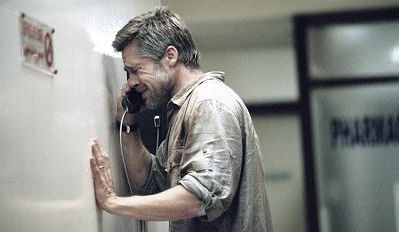
Spare and precise, the Babel script tells four stories that take place in three coun- tries — Tunisia, Mexico and Japan. Clearly an exotic element here, and yet the film uses a plot device (and in fact a thematic strategy) that fans of Inarritu’s last two films will immediately find familiar.
The story’s about several disparate characters (four of them played by Brad Pitt, Cate Blanchett, Gael Garcia Bernal and a young unknown Japanese actress, Rinko Yakusho) who are linked, in the same way that the characters in Inarritu’s Amores Perros and 21 Grams are linked, by a single violent act.
< ?php include ('/home/hollyw9/public_html/wired'); ?>
“I can say the film is about incommunication, misunderstanding and loneliness,” Inarritu said in an interview we did on 5.5, or about twelve days ago.
“But for me, on a personal level, being such a multi-dramatic film, the bottom line DNA of this film is about how fragile and vulnerable we are. How do you say, this is a chain, this is a little piece of the chain? A link? For me when a link is broken then the chain is broken. And that, for me, is what this film is about.”
The Tunisian section has two stories — that of a married American tourist couple (Pitt, Blanchett) and their encounter with a bullet, and a story about how that bullet is haphazardly fired from a long distance away by a pair of youths playing with a newly-purchased rifle, and about the consequences of this.
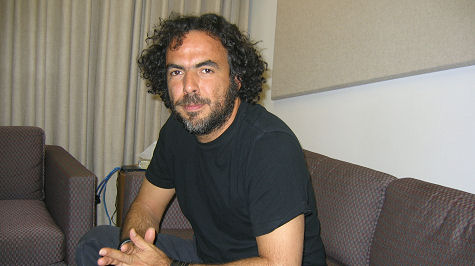
Babel director Alejandro Gonzalez Innaritu during interview at CBS Radford — Wednesday, 5.3.06, 1:10 pm.
The Mexican section is about this couple’s nanny (Adriana Barraza) and her taking Pitt and Blanchett’s kids (Elle Fanning, Nathan Gamble) across the border into Mexico for a wedding, which leads to bad things all around, particularly for her nephew (Gael Garcia Bernal).
The Japanese portion is about the relationship between a wealthy businessman (Koji Yakusho) and his deaf daughter (Rinko Kikuchi), and the daughter’s encoun- ters with various men, among them a visiting police detective.
I wasn’t allowed to see Babel as part of my interview deal, but as I waited to speak with Inarritu I saw a bit of footage on the large editing-room screen.
It showed a hyper, frenzied, salt-and-pepper-haired Pitt, playing, as Inarritu described, “a 49 year-old…a guy who’s been through some tough times.” The footage showed Pitt’s character, who is called Richard, helping to carry his wounded bleeding wife (Blanchett) through the streets of a small Tunisian village.
I began our chat with my observation that the script feels good and strong at first, but smallish and concise and a bit less plot-driven than Amores perros and 21 Grams Then it sinks in a bit, and then it really kicks in the next morning.
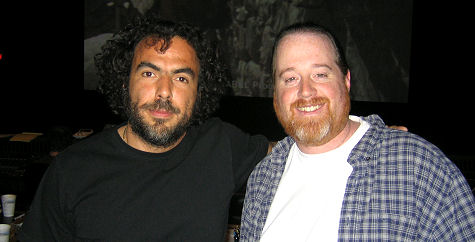
Inarritu, Babel editor Stephen Mirrione — Wednesday, 5.3.06, 1:17 pm
“That’s a good wine you’re describing,” said Innaritu. “I agree — it’s a very multi- layered film. I’m still looking to it. Every time, as I am seven months with this, every time I discover more layers, more things…it’s true what you are saying.”
Babel‘s similarity to Amores perros and 21 Grams — all three being about a violent blow shattering many lives — may suggest that Guillermo Ariagga, the screenwriter of all three as well as author of the Tommy Lee Jones western The Three Burials of Melquiades Estrada, had something to do with shaping Babel‘s basic plot. But Inarritu says it was pretty much his own.
“Babel was an idea I had when I first arrived in the United States,” he recalls. “This film would have been impossible without me being a director in exile, I would say. Because what comes from this is that you have a consciousness…a very strange perspective of your country and of yourself.
“I’m speaking of a complex relationship between a citizen of a Third World country” — Inarritu was born, raised and launched his career in Mexico — “and this country, and the traveling that I have done in the last six years, the way you understand things. So I guess that was what [led] to the necessity of making this film.
“So I started working on this thing with Carlos Cuaron [the brother of Alfonso Cuaron and screenwriter of Y Tu Mama Tambien]. In the beginning. He would be the writer. But we began it as an argument and never took it beyond that, so we decided that he would do another project that we were developing.

Babel costar Rinko Kikuchi
“At this point I invited Guillermo to participate in this story, and we obviously…as part of that process, we decided to share a lot of things.”
“I think Babel is different from Amores perros and 21 Grams because the range of this film is completely different, style-wise, than the other ones. Because every story has a particular narrative and personality, and I feel that this is a more cinematic piece.
“I tried to combine the realistic aesthetic that normally I have been working in, but qualitating from an imaginary world where the music and the sound is a guiding force. There are a lot of sound elements in Babel. I was really taking the audio seriously. Using it to try and be inside a character.
“I stripped down so many things in the script by myself, and I was constantly adjusting and adapting and rewriting a lot of things based upon the culture and the situation I was in. It was a very difficult and informative process.
“I feel it is a very different film from the other ones — you will see this soon — in tone and style. It’s more cinematic. I can only put only one line in the script, but in the shooting I can make a ten-minute piece out of a whole interior consciousness [trip] by one of the characters.
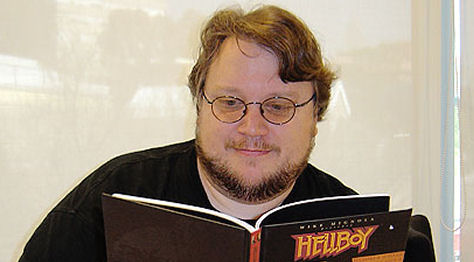
Inarritu ally and pally Guillermo del Toro, director of Pan’s Labrynth
“I had to make a lot of decisions. In a good way. I added some things, and I also took out some things. I was shaping a lot and learning a lot and learning the limitations of the actors. So in the end I took out like 30% of the script down, in the editing. So there have been a lot of changes.”
We spoke of Rinko Kikuchi, a non-hearing-impaired Japanese actress that Inarritu cast as a sexually provocative teenager who has a hang-up about male attention, or a lack of.
“I first went to Japan in December 2004…just by myself, the trip being self-financed like always,” Innaritu said. “I was looking for a Lolita kind of star, not quite attractive in an obvious way but one that you can really have some bad thoughts about her, but not quite in that way. It was difficult.
“I saw Rinko once, and then again nine months later when I returned, and I had never prom ised anything but she had studied sign language all by herself and signed as well the other girls. I can tell you she was better than the deaf girls. It was really impressive.
At what point did he sign Pitt, Blanchett and Bernal?
“I approached Brad and Cate in, I think, January or February of ’05, and they said yes and we were shooting by May 2nd. It was a very fast process. Brad is playing an older character. I want to give him a kind of gravity so he looks older. No more boyish, and I think he looks great. I told him, I think you will be a very interesting old man.
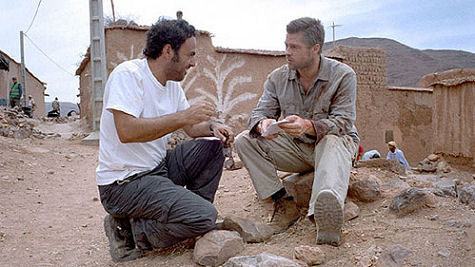
Inarritu, Pitt during filming in Morocco, late May 2005.
“Gael, I always wanted We originally had just two stories…the Moroccan kids story [he used Morocco as a Tunisian substitute] and the Americans who receive the shot, which originally, by the way, was the man who received the shot…we changed it later to the woman…but this was a very, very early stage in the argument I had with Cuaron.
“But we needed two more stories, I said. We need to tell a story about Mexico, about a nanny. The story about Mexico and the border because I am very affected by that. The nanny who works with me at my home is called Julia, and she has told me the saddest stories you’ve ever heard. So for the border sequence, I always felt that would be best to have Gael. Partly because he is a master of accents and people in the north talk very differently. Always I have him in mind.
“We went into pre-production in Morocco in March ’05, and we started shooting May 2nd. All three countries in sequence. The last day of filming was December 1, 2005.
“We shot in Morocco, and then pre-production in Mexico, and then we shot in Mexico, and then over to Japan for pre-production and then we shot there. It was the same as doing four separate films, which was intellectually and emotionally very difficult. To shoot something in Morocco and at the same time think about the likelihood that a scene would cut directly into a scene I know I will shoot in Japan seven or eight months later. It was an exercise.
“And it was such a struggle, about going or not going to Cannes,” he added. “But we finally decided that Cannes is a good platform for this kind of film. It’s a four-language film, a very personal film, a very complicated film, and this festival exists for that…for this kind of film.

“Now, I’m not sure exactly who is going to be in Cannes. Perhaps with Brad and his baby coming he will not be there…I’m not sure. But possibly Cate will come. And all the other actors. We are working on getting visas for the little [Moroccan] kids.”
I mentioned the cliche about filmmakers facing the inevitable pit of depression after they have finished a long project. To avoid this some directors develop one, two or three films at the same time so they can jump right into the something fresh after one is finished.
“The only way I can conceive films like this is being quiet and being alone,” Inarritu replied. “If I go into the machinery, into the factory thing, it’s good but I don’t know that I have the skills to have three girlfriends. I’m a one-woman man.
“From Amores perros to 21 Grams I needed two years. It is always that. That is the time I need to assimilate, to be working the characters, to know who they are. It’s a very conceptual and quiet internal process, and I need that time to develop it.”
I mentioned Inarritu’s excellent BMW commercial, “Powder Keg,” which was made in ’01 and co-starred Clive Owen, and then asked if he had been approached to do one of those idiosyncratic American Express commercials that M. Night Shyamalan and Wes Anderson have directed.
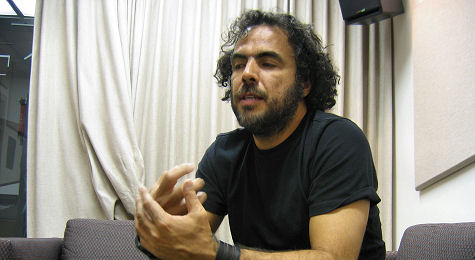
Wednesday, 5.3.06, 1:12 pm
“They offered me to do one, and I reject,” Inarritu replied. “I reject because, first of all, for me, to expose myself with a crowd like that…it’s like a capitalist statement. I worry about that statement. It’s not safe in Mexico to be the American Express guy. That’s not a smart thing for me.”
Inarritu took part in that recent, very large Latino demonstration in Los Angeles (which also happened in other cities) against a proposed change in U.S. immigration and labor laws that would adversely affect the economy and culture of Latin communities all over.
“I didn’t send my kids to the school that day — I took them with me [to the demonstration],” Inarritu said. “The guys in the editing room were shouting bad things at me. We were facing a deadline, they said. I said, ‘Guys, a man is defined not just by work but by what he believes.’ They were furious at me.
“The kids and I took a taxi and arrived on Broadway downtown, and we spent four hours there and the kids loved it. It was peaceful, not angriness. You need us, we need you. It was a beautiful experience. An amazing experience.”
It seemed to me like the biggest and best organized demonstration by Latinos in this country ever, I said. “Mexico doesn’t have that kind of organization,” he replied. “If we had that power in Mexico we would throw out the president. This is a human rights thing.”
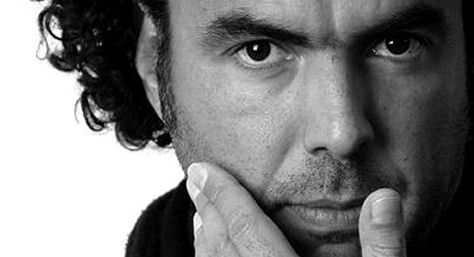
We discussed his director friend Guillermo del Toro, who has advised Inarritu about pruning his films in the editing room, and who has his own film, Pan’s Labrynth (Picturehouse), showing at Cannes this year. Inarritu calls it “very sad.”
“I helped him finish it,” he explained. “He helped me to take out three minutes from my film, and I helped him take out nine minutes from his.”
He then switched back to Babel by asking, “Did you like the script?” Very much, I repeated. I guess I hadn’t really said that in my initial comments.
“The other ones were more plot driven,” Inarritu said. “This one is more character driven. One of the things I liked the most about it is the Japanese section, because there’s nothing happening. There is no plot in it. It is the undercurrent thing that, little by little, begins to take you somewhere.”
“Unlike its counterpart at the Academy Awards, the red carpet at the Cannes Film Festival (set to begin Wednesday, 5.17) is the place where suspense comes to die. The only filmmakers who reliably attend the Cannes award ceremonies are winners of the festival’s various prizes, so all a savvy observer really needs is a passing knowledge of the films, and an unobstructed view of the limos, to figure out who’ll be going home with the coveted Palme d’Or.” — John Anderson in Sunday’s (5.14) N.Y. Times.
Please, yes…a Judas-was-a-good-guy-who-was-in-on-the-big-plan movie. That would be a movie. I’ll pay to see it twice, especially if Joaquin Phoenix plays Judas. And the story/background that the Guardian‘s John Patterson has sketched out is fascinating. One thing, though: there’s already been a Judas-was-a-good-guy-who-was-in-on-the-big-plan movie. It was called The Last Temptation of Christ, an exquisite 1988 film directed by this guy…wait a sec…here it is… Martin Scorsese .
I opened this New York Post story by Stephen B. Hunt about “a sold-out Eurpean tour” thinking it would be about the junket-whore DaVinci Code train from London to Cannes that leaves on Monday or something and arrives in Cannes just before the press and gala screenings start on Tuesday night, 5.16. But nope…just another DaVinci hubbub story.

This Variety variation by Elizabeth Guider about how the film is expected to fare a European country-by-country basis is more interesting.
